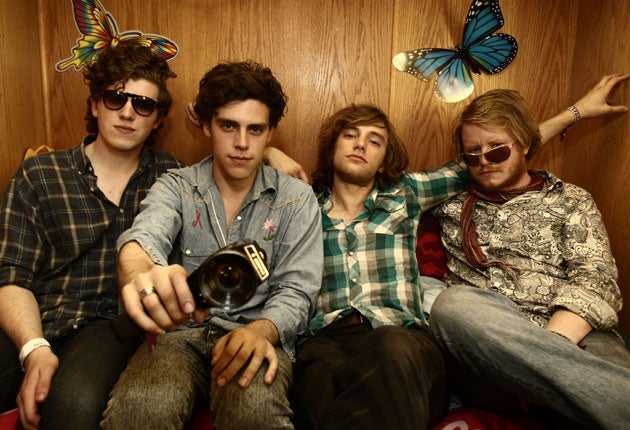Nowt so cool as folk... and that's no pipe dream
Young and trendy folkies are breathing new life into traditional music. Yes, really...

Your support helps us to tell the story
From reproductive rights to climate change to Big Tech, The Independent is on the ground when the story is developing. Whether it's investigating the financials of Elon Musk's pro-Trump PAC or producing our latest documentary, 'The A Word', which shines a light on the American women fighting for reproductive rights, we know how important it is to parse out the facts from the messaging.
At such a critical moment in US history, we need reporters on the ground. Your donation allows us to keep sending journalists to speak to both sides of the story.
The Independent is trusted by Americans across the entire political spectrum. And unlike many other quality news outlets, we choose not to lock Americans out of our reporting and analysis with paywalls. We believe quality journalism should be available to everyone, paid for by those who can afford it.
Your support makes all the difference.There isn't an Aran sweater or a leather sandal in sight: a new generation of smart and chic British folk musicians is taking the music industry by storm. A music form long associated with pokey pub back rooms is moving centre stage at some of the nation's premier venues and festivals. Music experts agree that 2010 will be the year of the new folkies. Here is our guide to the ones to watch.
While bands such as Bellowhead are not yet household names, they can claim fans as diverse as the Red Hot Chili Peppers, Glen Campbell and Frank Skinner, and are artists in residence this year at London's Southbank – a venue more normally associated with the London Philharmonic.
Guitarist Newton Faulkner, with his blond dreadlocks and edgy clothing, looks fit for the fashion catwalk rather than a folk festival stage. West London folkies Noah and the Whale have become NME darlings, their international profile boosted massively by the use of one of their songs in a car commercial in the US.
Though folk was marginalised by pop and rock in the 1970s, a glut of computerised music and a fragmenting recording industry have inspired moves in the opposite direction: players now want to return to traditional instruments and live performance.
"Because you can't get big record company advances any more, it's resulted in a nurturing of a folk-based music culture," said music critic Nick Coleman. "Groups like Bellowhead are so relatively successful because they are coming out of the folk tradition but not being bound by it. In the same way as the last folk-rock revival in the 1970s, bands were coming out of the tradition recognising its fundamental beauty, but knowing that you don't have to sound 100 per cent traditional."
This movement has been recognised by the Government, which recently gave the English Folk Dance and Song Society (EFDSS) an annual grant of £400,000 to aid folk musicians in performing and recording.
Cecil Sharp House, the home of the EFDSS, houses recordings of folk music going back hundreds of years. Many modern artists visit the library to gain inspiration, including Blur's guitarist Graham Coxon who was at a gig at the house yesterday in memory of the folk guitarist Davy Graham who died last year.
Newton Faulkner
The singer/songwriter cites US grunge rockers Pearl Jam as a major influence and with his dreadlocks, certainly looks the part, so low marks for folk roots. Nevertheless, admired among guitarists for his rhythmic playing and finger-picking style.
Bellowhead
The riotous 11-piece from Oxford get full marks for authenticity by playing everything from the bazouki to bagpipes. Their debut album contained Brazilian sea shanties and music from the Napoleonic wars. They played at the BBC Proms last year.
Eliza Carthy
The fiddle player from Scarborough in North Yorkshire was born with performance in her DNA. Her father is singer and guitarist Martin Carthy and her mother the singer Norma Waterson. She opened the St George's Day festival in Trafalgar Square this year.
Lau
Hailing from Scotland, this three-piece comprising fiddle, guitar and accordion players, won the best group award three years into their career at the BBC Folk Awards 2008. Since 2007, touring has taken them across Europe, the US and Japan.
Mumford and Sons
The group rose out of London's folk scene in 2007 along with other acts such as Laura Marling and Noah and the Whale, before signing to major label Island Records. At the rockier end of folk, with an edgy sound that has won them a non-folk fanbase.
Noah and the Whale
British NME darlings cite punk as being as much as an influence as folk. They had a Top 10 hit with '5 Years Time' which was in a car advert. Played festivals from Glastonbury to Lollapalooza.
Laura Marling
One of the youngest musicians on the folk circuit, she was once denied access to her own gig for being under age. Marling, now 19, has enjoyed much critical acclaim and was nominated for the Mercury Prize last year.
Jim Causley
Another folk singer who specialises in traditional songs from his native Devon. Grew up surrounded by traditional music: his family is a Devon folk dynasty, prominent in the West Country folk scene.
Seth Lakeman
The West Country troubadour, who has been playing professionally since his teens, is at home playing to thousands of people at Glastonbury as he is on the small stages at some of the country's smaller folk festivals.
Heidi Talbot
The 29-year-old began honing her singing skills in a church choir in rural Ireland, before moving to New York when she was 18 and joining the Irish-American group Cherish the Ladies. Winner of an Indie Acoustic award for best album in 2008.
Join our commenting forum
Join thought-provoking conversations, follow other Independent readers and see their replies
Comments